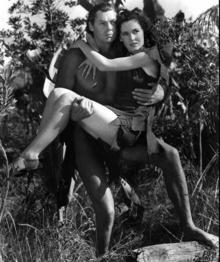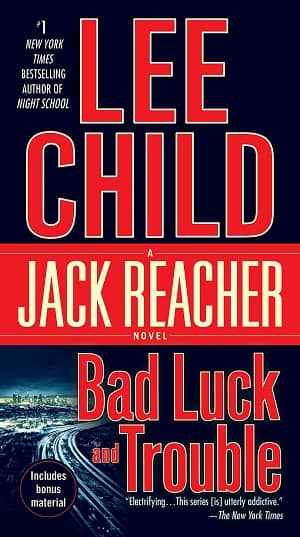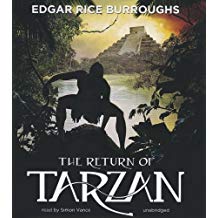Is Jack Reacher Today’s Tarzan?
 For me Tarzan was always a movie, and sometimes a TV character. I knew intellectually that the stories were based on books. I even knew that the books were written by Edgar Rice Burroughs. But for me, at that time, it was all about the John Carter of Mars books. I did finally read one of the later Tarzan novels, Tarzan the Untamed, and while I liked it, it wasn’t enough to woo me away from Burroughs’ SF writing.
For me Tarzan was always a movie, and sometimes a TV character. I knew intellectually that the stories were based on books. I even knew that the books were written by Edgar Rice Burroughs. But for me, at that time, it was all about the John Carter of Mars books. I did finally read one of the later Tarzan novels, Tarzan the Untamed, and while I liked it, it wasn’t enough to woo me away from Burroughs’ SF writing.
I’ve always been aware of Tarzan as a character icon, of course, the early 20th-century version of the noble savage. I’ve written about him before. I mention him as far back as 2014, one of my earliest posts for Black Gate, when I was looking at swords and ERB. More recently I’ve looked at him as an iconic character in the same vein as Sherlock Holmes and Robin Hood, characters which keep turning up on both big and small screens.
It’s only lately that I’ve actually started reading the books. Amazon had one of these get all 26 novels for $2.99 deals and it seemed stupid not to get them. So far I’ve read the first two, Tarzan of the Apes, and The Return of Tarzan. In general, they’re a lot of fun, and I’ve found them a lot less racist and a lot less misogynistic than I’d anticipated, given the time period of the writing. There’s definitely stuff that makes me either cringe or roll my eyes, but as I say, not as much as I expected.
 I was talking to my husband about the Tarzan books and at one point he said, “He sounds like Jack Reacher.” Reacher, for anyone out there who doesn’t know, is the main character of a series of thrillers written by Lee Child. And when you look at the two characters a little more closely, you can see what my husband was talking about.
I was talking to my husband about the Tarzan books and at one point he said, “He sounds like Jack Reacher.” Reacher, for anyone out there who doesn’t know, is the main character of a series of thrillers written by Lee Child. And when you look at the two characters a little more closely, you can see what my husband was talking about.
From the writers’ point of view, both characters require a certain set of skills, and both were given a somewhat prescribed yet exaggerated background to account for those skills. Both grew up in relatively closed societies, Reacher the US military, Tarzan a tribe of jungle apes, and both were introduced to the world at large (in the case of Tarzan, human society) as mature men.
 Both characters are described as enormous physically, with the word “gorilla” applied frequently as a descriptive word. Both, because of their backgrounds and training, are superb fighters, almost inhumanly fast. And uncommonly ruthless. Both, for example, seem to subscribe to Reacher’s mantra: “get your retaliation in first.” Neither is particularly bothered by killing, viewing it as a natural consequence or outcome of specific circumstances – nor is either particularly perturbed by the idea of their own deaths.
Both characters are described as enormous physically, with the word “gorilla” applied frequently as a descriptive word. Both, because of their backgrounds and training, are superb fighters, almost inhumanly fast. And uncommonly ruthless. Both, for example, seem to subscribe to Reacher’s mantra: “get your retaliation in first.” Neither is particularly bothered by killing, viewing it as a natural consequence or outcome of specific circumstances – nor is either particularly perturbed by the idea of their own deaths.
Strangely, both are educated, both speak French. It’s not generally known by people who didn’t read the books – that is, me until a few weeks ago – but Tarzan was literate at a very early age. I don’t know whether it’s possible to teach yourself to read and write in the manner that ERB describes, but it’s certainly credible in the context.
Reacher is definitely more cynical, but Tarzan hasn’t much of a problem assuming the worst, and acting accordingly. Neither has a particularly high opinion of human nature. Both are fiercely loyal, but to people rather than ideas. Both, like the fictional hard-boiled detectives contemporaneous with Tarzan, have moral standards different from, and yet in some ways superior to the society around them.
As I said earlier, Tarzan is one of those characters which keep appearing in movies and TV series. Now, Reacher as appeared in 2 films, and there is talk of a TV series being in the works.
I don’t know about you, but all this is starting to feel eerie.
Violette Malan is the author of the Dhulyn and Parno series of sword and sorcery adventures, as well as the Mirror Lands series of primary world fantasies. As VM Escalada, she writes the Faraman Prophecy series, Book One, Halls of Law, and Book Two, Gift of Griffins. Like Violette’s page on Facebook and follow her on Twitter @VioletteMalan.
Gore Vidal said that ERB was “innocent of literature and incapable of reproducing human speech” but also that he was one of the greatest writers of action that ever lived, which is about right. I too came to Lord Greystoke only after first reading the Barsoom (and Pellucidar and Venus) books, so John Carter will always be first in my heart, but Tarzan is one of those characters – like Frankenstein’s monster – who escapes the confines of his book and just keeps going. Long may he swing through the jungle and eat raw meat and get befuddled by Atlantean priestesses and all the rest of that stuff he does so well.
Thomas: That Gore Vidal, what a card. It’s possible that his experience of human speech patterns may have been narrower than he thought. On the other hand, do we know how people spoke in other times as opposed to how writers wrote dialogue?
Tarzan, like Frankenstein, Zorro, Robin Hood, et al are now phenomena in their way, aren’t they? Larger than the books they came from.
I do think Vidal was right about the action. Once you’re read Tarzan’s battle to the death with Kerchak or the slave revolt in the arena of Issus, you’ll never forget them.
I think I had read Tarzan first (whichever random assortment of Ballantine paperbacks were on the public library spinners), but John Carter really won my heart.
I just reread Barsoom late last year and thought they still held up quite well; I’m a bit afraid to revisit Tarzan at this point.
(Having said which, I _desperately_ wish the Burroughs estate would issue authorized, corrected eBook editions of all of his work.)
Interesting parallels. There are several literary creations that have both outlived their authors and become somehow bigger (and more influential) in memory than they were in the books. Tarzan is like that for me as is the universe H.P. Lovecraft created.
It takes a while for me when rereading to get myself in the mindset to enjoy ERB the way I did when I was a young teenager, but I feel that way about many of my first books. It’s interesting to see what still holds up to revisiting.
Thomas: the action sequences are so good I’m thinking of stealing a couple of them. Less biting maybe. I particularly like how he worked out strategies to enable him, a smaller, weaker person, to triumph over larger, heavier, stronger types. He’s the type that would have invented a martial art.
Joe: I’d like to see corrected e-book editions as well, though I think I’m getting a true feel for the Tarzan even in this edition. I was surprised how well the Tarzan held up. I was expecting not only more racism and misogyny, but bad science as well. There’s a little of each, of course, but it’s there out of ignorance, not bigotry, if you see what I mean. It’s a long time, if ever, that I’ve heard Arabs referred to as “white.”
James, the ability to shift your mindset to match what you’re reading is a valuable asset. I have to do it when I’m rereading any 18th-century stuff, even though that’s what my PhD is in. Don’t get me started on Shakespeare.
To be clear, when I said “corrected” I mostly meant “not as typo-ridden as most of the public-domain eBook editions currently floating around on Amazon”.
Having said which, I did discover a few years ago that the edition of Tarzan of the Apes I read (Ballantine paperback from the 1970s) had been edited — in older editions (even the Ace paperbacks from the 1960s), Esmerelda, the maid, spoke in really, really awful dialect which was toned down substantially in the Ballantine.
Joe, that’s what I though you meant by “corrected.” The two books I’ve read so far had plenty of typos. You may be assured, however, that in the e-books I’ve got Esmerelda’s dialect is intact. That’s one of the racist bits that make me cringe.
Yeah, I’m not sure if Esmerelda’s dialect would have registered when I was reading it 40-odd years ago, but it did take me aback when I first got an original version.
Joe: ditto
Try http://freeread.com.au/@RGLibrary/ERBurroughs/Tarzan/Tarzan.html.
All of the Tarzan books have been re-edited and reformated.
Jack Reacher just moves around and Trouble finds him every time. I just finished reading the new Jack Reacher novel, PAST TENSE. And, for sure, it gets tense as the reader tries to figure out what is going on as more and more strange events swirl around Reacher.
Tarzan seems more mission-oriented.
Bobby: thanks for letting us know.
Kelley: I wonder if we might be seeing a difference in the way adventure/thriller stories are written in the 2 eras? That is, does the approach of the Reacher novels reveal a certain floating aimlessness about the society in which they’re written, and do ERB’s novels reflect a society in which goal-orientation was the norm? They’re great reads, either way. I’m looking forward to reading Past Tense.